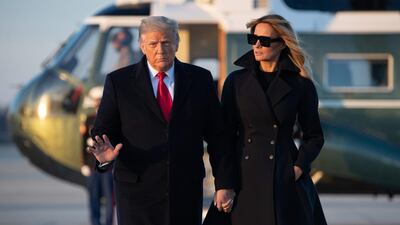Recent deployments by the US military to the Middle East as well as threats by Donald Trump are aimed at deterring Iranian aggression ahead of the anniversary of the US killing of a top general, a White House source told The National on Thursday.
US President Donald Trump’s warning to Iran on Wednesday night to “think it over” before taking action that could kill any American in Iraq, comes on the heels of heightened alert inside the US government of a possible Iranian-backed attack in the region in the coming weeks.
Iran tensions – in pictures
Even as Mr Trump headed to Mar a Lago for the Christmas break, he offered “some friendly advice” to Tehran on Wednesday evening. "If one American is killed, I will hold Iran responsible. Think it over,” he wrote.
The Tweet included what the president said was a photo of three Iranian rockets that targeted the US embassy in Baghdad on Sunday resulting in no casualties and only minor damage.
The attack and Mr Trump’s threat comes as the US military and intelligence sees a heightened risk of Iranian-American escalation ahead of the anniversary of the US strike that killed Iranian military leader Qassem Suleimani on January 3.
The head of the US Central Command General Kenneth McKenzie told ABC on Tuesday that while Iran may not be seeking war with the US, the environment is that of escalation.
"I do believe we remain in a period of heightened risk … We’re not looking to escalate ourselves. We're not looking for war with Iran, I really want to emphasise that."
In the past two weeks, the US military and navy has sent B-52 bombers and the USS Georgia submarine to the Gulf region.
On Wednesday, CNN reported that a high-level security meeting was held at the White House to discuss Iranian threats.
No military strikes were approved at the meeting, one official said. But across the US government, contingency plans are available in the event that Iran crosses Mr Trump’s red line and an American is killed in any attack by Tehran or its armed proxies.
Mr Trump’s Presidency has seen unprecedented escalation with Tehran in the form of sanctions, cyberattacks, strikes in Iraq, and leading up to the assassination of Suleimani. The outgoing President is set to leave office on January 20 after losing the November 3 election to his Democratic rival Joe Biden.








